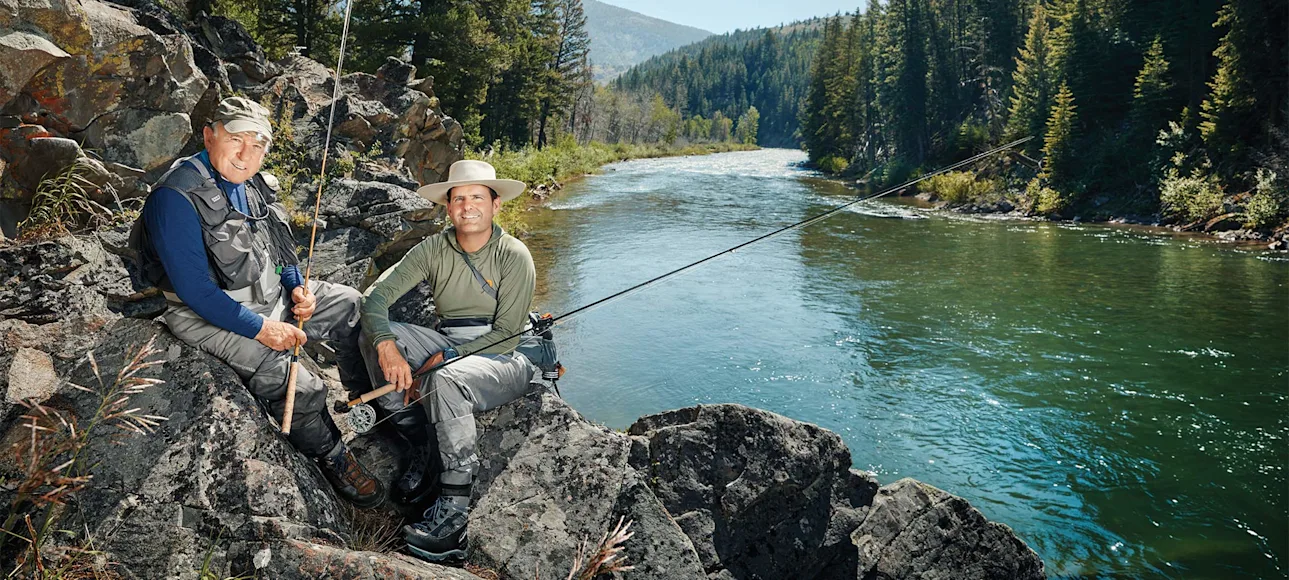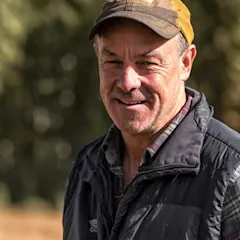It has been a high-water year in Montana’s Bob Marshall Wilderness, and the river is running bank-full and ice-cold, even now, in the middle of July. But the water is clear as ether, and we can see the cutthroats holding in the current, their perfect fluid shapes against the clean gravel of the bottom, their backs as green as emeralds. We have all stopped talking for the first time all morning, watching the river and the up-and-down dancing of a hatch of caddis in a shaft of hot sunlight. The fish begin to rise, dimpling the surface, and there is a heavier splash near the cliff on the far side of the river. Yvon Chouinard is rigging up his Tenkara fly rod—an unadorned 12-foot collapsible pole with no reel. The line holder near the butt is held on with two slightly bent paper clips with rubber bands. It is a simple rod for a man who strives for simplicity.
Chouinard has the blunt hands and thick forearms of the blacksmith he has been for almost 60 years, scarred from work and from climbing rock and ice from southern Argentina to the Arctic, surfing breaks all over the world, living off the land and sea, fishing and hunting and wandering. Somewhere in there, early on, he used his blacksmithing skills to make climbing gear that would not scar the rocks and cliffs—a kind of leave-no-trace ethic at a time when such a thing was unknown.
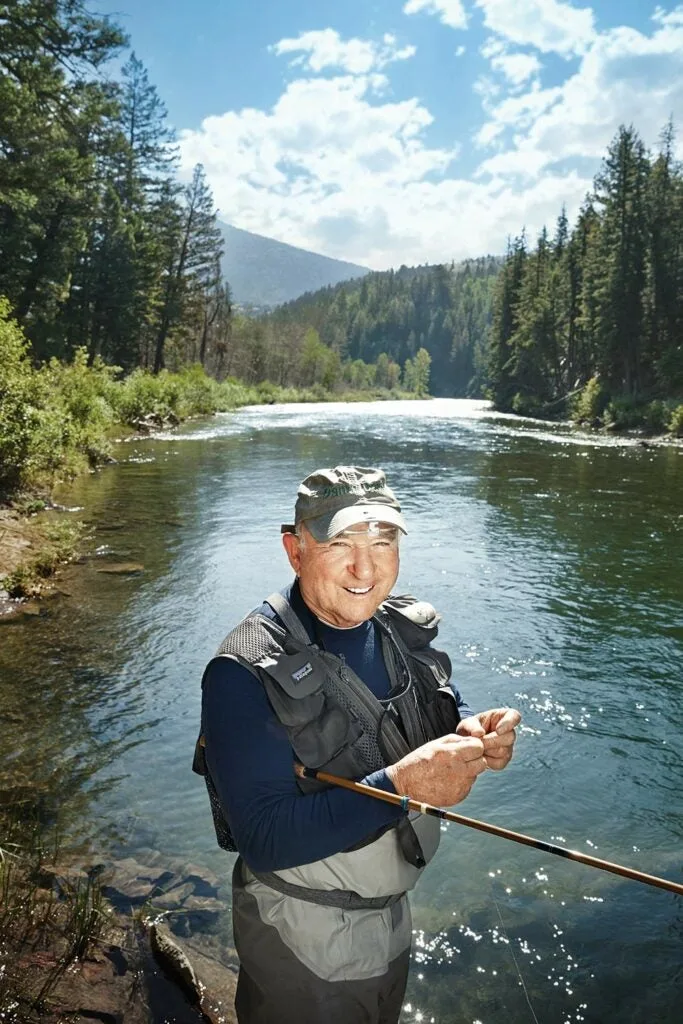
The demand for the new gear led to the creation of Chouinard Equipment Ltd., which, after revolutionizing the world of mountaineering, went bankrupt in 1989. It took him 12 years to write his first book, Climbing Ice, which was published in 1978 and became the bible of an emerging sport. His search for clothes that would not fall apart on the huge rocks that he and his friends were climbing in Yosemite led to the founding of Patagonia, which would go on to become one of the world’s most successful outdoor clothing companies. At 79, wealthy beyond his wildest dreams, Chouinard is still the minimalist he was as a youth climbing in the Bugaboo Spires of Canada and surviving on snared ground squirrels. His short frame is still compact and agile, his clothes simple and worn. The Tenkara rod is just another iteration of this, like the single fly pattern he uses and ties himself—a small midge-like wet fly.
Chouinard, an obsessive fisherman, lifelong outdoorsman, and self-described “dirtbag” (he didn’t own a tent until he was 40 years old, preferring to sleep outside), might be the world’s most unlikely billionaire, and he plans to use his money, his company, and the time he has left to save the planet. To do that, though, he needs to join forces with America’s hunters and anglers.
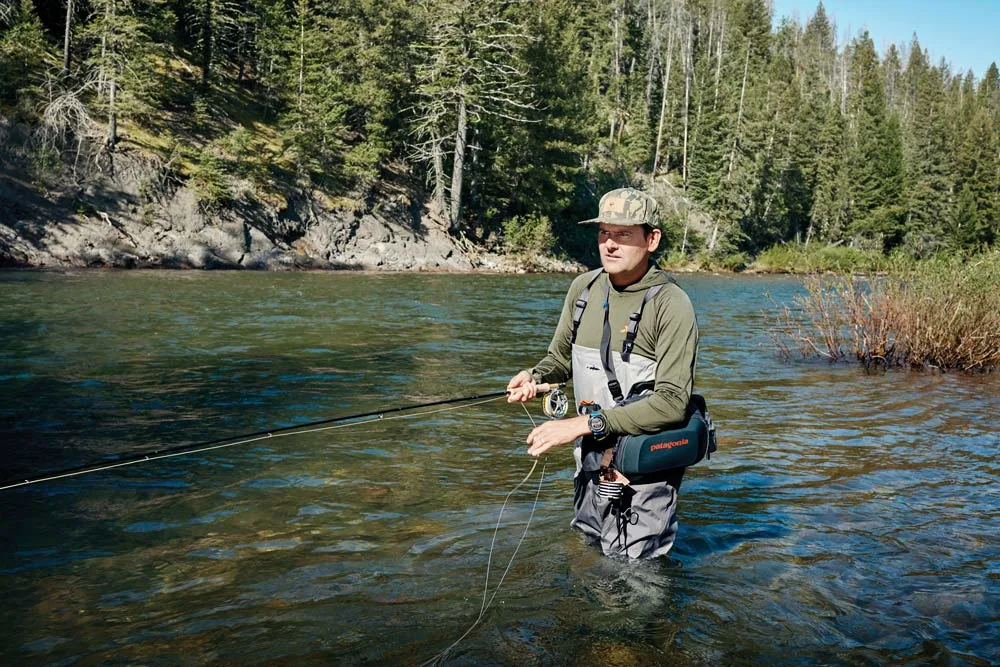
Carruth casts upstream. Chris Crisman
Fishing on Common Ground
Kenton Carruth is already hooked up to a cutthroat, fishing a small Adams and wet-wading up to his waist in the freezing water of Montana’s Bob Marshall Wilderness. Carruth is the co-founder of the hunting gear company First Lite. Like Chouinard, he is an accidental businessman—a 48-year-old outdoorsman and mountain athlete who came to the Sawtooths of Idaho as a professional snowboarder when he was in his early 20s. He’s always been a fisherman, but when he arrived in Idaho, he discovered bowhunting for bugling bull elk on public land, followed by the whole wild bounty of hunting in the West for mule deer, waterfowl, and upland birds. He worked his way through a roster of seasonal jobs that would be familiar to a lot of young outdoor obsessives in the Rocky Mountains, from contract logging to construction to freelance photography. Then, in 2007, Carruth and his buddy Scott Robinson founded First Lite because they were using merino wool clothing for skiing, snowboarding, and mountain biking but could not find any with a camo print for hunting.
“I remember going to my first SHOT Show, and the whole booth fit into one backpack,” Carruth says. “But we also sold out everything we had.” As First Lite’s business exploded, becoming an economic power beyond its base in the small town of Ketchum, Idaho, Carruth and Robinson realized that their company, like so many others across the U.S., could not exist without wild places, public-land hunting, wild game, and clean rivers. They loved these things themselves—and profited from them—so they wanted to make sure such things stayed around for future generations. So, First Lite became an outspoken leader in the world of conservation, which was, as Carruth explains, “also just good business.”
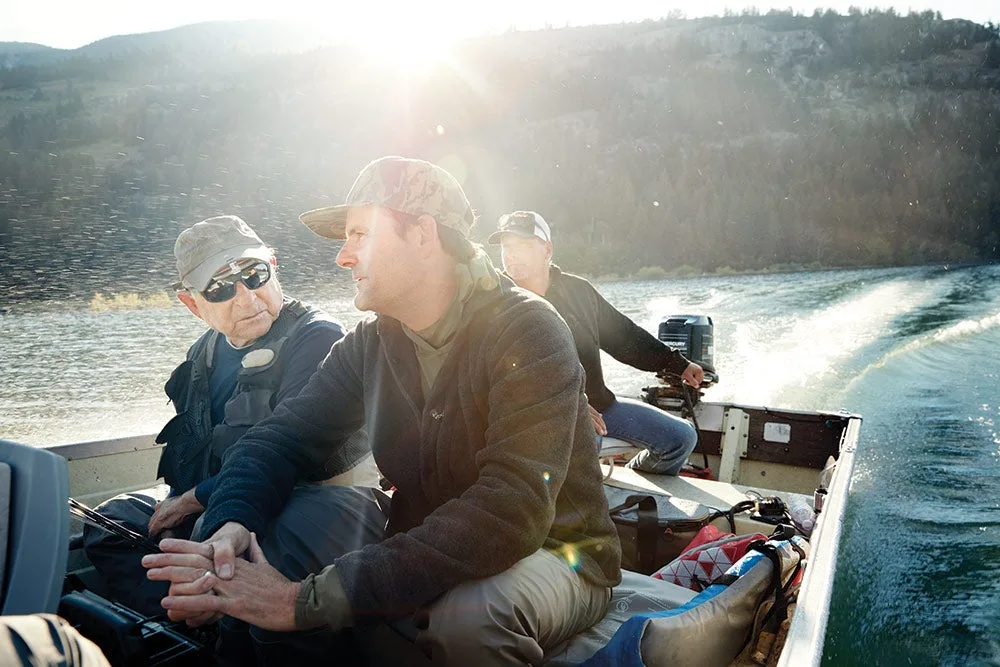
Motor City: Chouinard and Carruth ride toward the fishing grounds. Chris Crisman
What brought Chouinard and Carruth together this glorious July day in the Montana wilderness? The answer could best be summed up with the old Teddy Roosevelt quote, from the darker days of America’s history, when it looked like we were going the way of the rest of the world, wiping out our wildlife, polluting our rivers, ransacking our wilderness for the last two-by-six or mouthful of grass: “The conservation of natural resources is the fundamental problem. Unless we solve that problem, it will avail us little to solve all others.”
Put plainly: After decades of success in solving some of the thorniest issues in conservation, America is losing ground, and losing it fast. Hunters and fishermen were once both the cutting edge and the overwhelming force for protecting our waters, clean air, wetlands, wildlife, and habitat, fisheries, and public lands. We still pay for the lion’s share of conservation, with taxes on firearms and ammunition (like Pittman-Robertson), fishing and boating taxes (like Dingell-Johnson), and waterfowl stamps and hunting and fishing licenses. But our numbers have been falling every year. An increasingly polarized political field in our country—right versus left, nothing in between, and neither side focused on conservation or wildlife—has turned what was once our power into meekness.
As Ryan Callaghan, director of conservation and public relations for First Lite and the one who organized this fishing trip, explains: Most hunters tend to vote Republican, “but we never ask for anything in return for our votes. We are taken completely for granted.”
The giant that was the hunter and fisherman conservation movement from the 1930s through the opening of the 21st century has been bound and silenced.
Which is ironic, because the very things that this conservation movement, and so much of our money, achieved—cleaner waters, access to public lands and rivers, restoring wildlife, and protecting habitat—is now the basis of an $887 billion recreational economy, one that has created 7.6 million American jobs and contributes $125 billion in federal, state, and local tax revenue. This is arguably the largest economy on Earth that does not demand political representation. Instead, we see active efforts by our elected leaders to roll back the laws, regulations, and policies that created the golden goose—from clean-water rules to stream access to the protection of wildlife habitat, and on and on, through the most recent attacks on long-standing success stories like the Land and Water Conservation Fund.
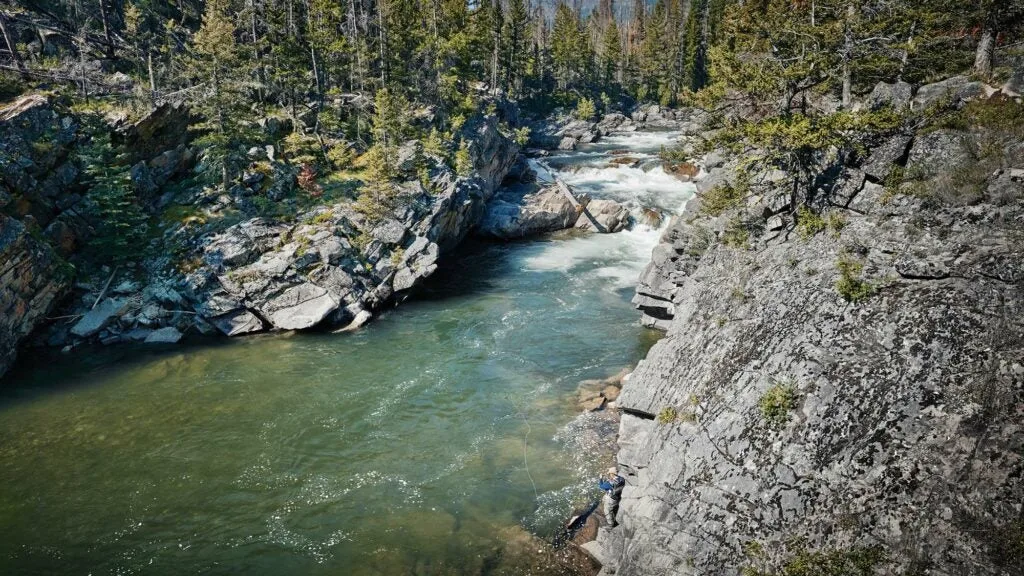
Cliff Hanger: Chouinard, a legendary rock climber, gets into position to target trout with his Tenkara rod. Chris Crisman
The most unsettling attack so far, though, has been the proposal by Republican leaders to transfer the 640 million acres of America’s public lands to state control. Sen. Mike Lee of Utah recently recommended selling and giving away all federally managed public lands in a new “Homestead Act,” and in the most recent Republican party platform, it says clearly: Congress shall immediately pass universal legislation providing for a timely and orderly mechanism requiring the federal government to convey certain federally controlled public lands to states. We call upon all national and state leaders and representatives to exert their utmost power and influence to urge the transfer of those lands, identified in the review process, to all willing states for the benefit of the states and the nation as a whole.
As Field & Stream has reported multiple times, such a transfer will almost certainly lead to the sale of federal public lands, just as millions of acres of existing state lands have already been sold off across the nation.
To anyone who loves the freedom of the American West, whether they are hunting elk or swinging ice axes up the side of a frozen waterfall in the high country, this is unacceptable. To anyone who makes their living as part of that $887 billion recreational economy, this is a direct threat to their livelihoods. More than any other single issue, this attack on American public lands is what has allied Chouinard and Carruth and brought them together on this little river in the wilderness. They run two very different businesses, with two very different kinds of customers, but the foundation of both businesses is the same: the American outdoors and the American public lands.
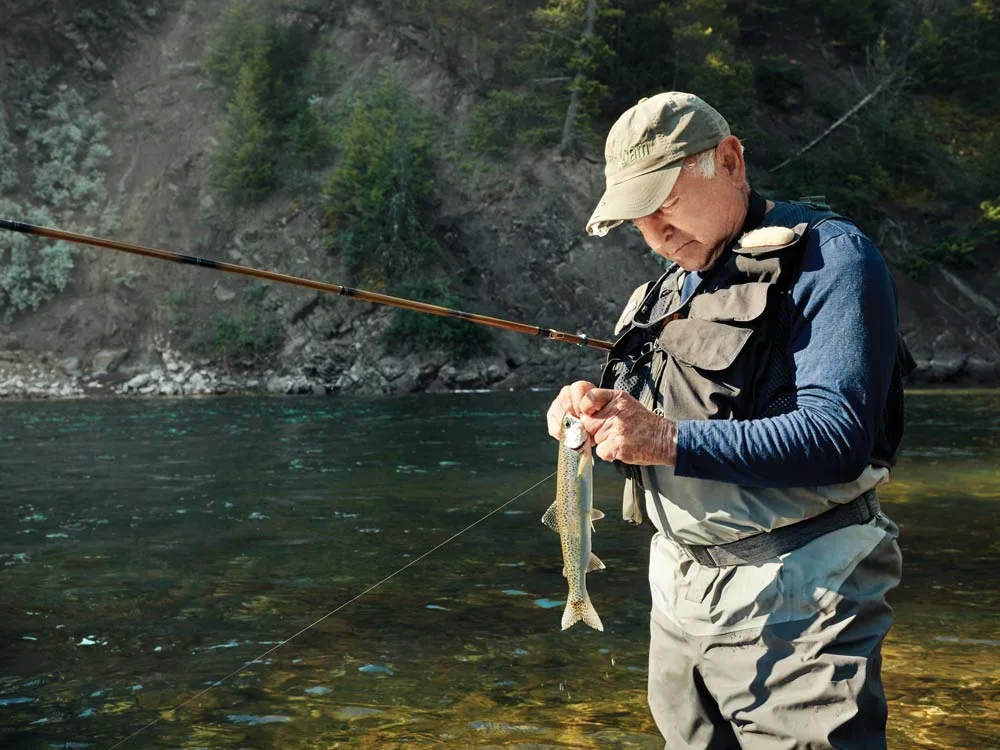
Chouinard prepares to send back a trout. Chris Crisman
Men of Action
Chouinard is one of the most pugnacious conservationists in America today. He is an upland bird hunter, and he and his family rely almost entirely on wild game for their meat (much of it given to them by hunting friends), but no one will mistake him for a good ol’ boy hunter, much less any kind of moderate.
“I’m a socialist,” he says, “and I don’t apologize for that. We live in a country where the rich are getting richer and the poor are getting poorer, and anybody can see where that is going. You have billionaires buying up huge chunks of land for themselves and shutting the people out of them. Look at Wyoming. You can’t even anchor a raft to fish. These people claim they even own the bottom of the river.”
As for Republicans, Chouinard is infuriated by the anti-public lands and anti-environment movements in the party—and by President Trump, whom he despises—reducing the Bears Ear and Grand Staircase–Escalante National Monuments at the request of Republican politicians in Utah. After Patagonia publicly protested the monument reductions, he says, “The House Natural Resources Committee was out there, telling everybody to boycott us, telling people that we make all of our clothes in Asia with slave labor.”
Utah Rep. Rob Bishop helped lead the calls for the Patagonia boycott, and Chouinard says their sales went up 600 percent that month. “He’s the best salesman we ever had.”
Chouinard is in the fight and has been for a long time. He also recognizes that unlike fishing and hunting businesses paying into Pittman-Robertson or Dingell-Johnson, his business does not automatically contribute to conservation through focused taxes (the nonhunting and nonfishing outdoor-recreation industry has fought against a so-called backpack tax modeled after Pittman-Robertson for decades now). So his answer has been to voluntarily give part of his profits to groups that he and his staff choose to fund. In 1985, Patagonia co-founded the Conservation Alliance, which now has 180 member companies drawn from every sector of the outdoor-recreation industry, and which has contributed more than $90 million to various conservation groups. His company also started 1% for the Planet in 2002, donating 1 percent of every sale to conservation groups and causes. In 2016, on Black Friday, the nation’s busiest shopping day, Patagonia donated 100 percent of its sales to conservation groups—about $10 million in one day.
Patagonia offers hundreds of small and medium-size donations to a diverse array of groups. Some of their grants benefit sportsmen, and some do not—but none of the groups funded by Patagonia are actively antihunting. “We all know there are crazies out there,” Chouinard told me. “All extremes would like to see us fail.” He said Patagonia has been attacked by animal rights’ groups for using wool, leather, and goose down. “It is just pure ridiculousness.”
This past April, Chouinard came to the annual Backcountry Hunters & Anglers Rendezvous, a weekend conservation fest in Boise. There, he met Carruth and other fellow businessmen whose livelihoods depend, as his does, on public lands. He also found himself among thousands of hunters and anglers—men and women, most of them young, of every kind of political bent—who were as passionate about adventure and wild places as he is.
“I felt like I’d finally found my people,” he said. Part of that kinship, he added, was that he’d met people who were willing and able to fight back, as he is, against the movement to privatize public lands. It seemed like, after being bound and passive for the past 20 years, America’s hunters and fishermen were in on the fight too.
“Hunters and fishermen still comprise a huge voice for public lands, and it is one that politicians can’t ignore,” Carruth says. “And the anti-public-lands groups know that. They do everything they can to divide us and keep us from recognizing how much we have in common with all the other users of the public lands and the rivers. This is in their playbook, and we’ve fallen for it. I wish that everybody would understand where we are now. We actually have people with tons of money who want to make an end to public lands and public-land hunting. They are working, actively, to take it all away from us.”
This threat is clear, and for Chouinard, the only way to respond is with focused aggression. “Our political leaders have to be more afraid of their constituents than they are of the lobbyists giving them all the money,” he said. “They have to understand that if they don’t represent the voters, there will be a cost—they’ll lose their jobs.”
Now or Never
We had been talking and fishing all day, scattering out upriver, coming back, studying the broad, smooth tracks of grizzlies in the mud of the trail. The light began to fade, and the sun lost some of its power, reminding me that up here, in these magnificent public-land headwaters, snow and ice hold on seven months of the year. We stop jumping in and out of the water and chase the last of the hot sun to the top of some cliffs. We’ve all caught good fish, and the bite is still on; there are even some giant stoneflies coming off, bombing in like drunken bats, to dabble on the water’s surface, some taken immediately by fish, some whirling away on the current.
The mood shifts as it always does after the intensity of fishing hard for hours. We have a brief discussion of Wyoming’s plan for hunting grizzly bears now that they’ve been taken off the Endangered Species List. Chouinard is opposed to the hunt. Carruth is cautiously supportive and sees state management of the bears, including hunting, as a success story in restoring an iconic wild predator. Carruth, like Callaghan and me, sees state management and hunting of wolves as a success story as well, while Chouinard cannot understand why anyone would want to kill a wolf. But the disagreements are friendly and based on the fact that, deep down, we love the same freedom, the same wildlife and wild places, the same nation.
Carruth goes on to talk about mountain biking, how he rides four to five days a week during the summer after work, all on public lands right near his home. “It’s not training for hunting, although it helps,” he says. “It’s what I love to do.”
Chouinard notes that what is really at stake, for mountain bikers and hunters, is a country where nobody has access to the kinds of challenges that humans need to be complete, and sane. “I’ve watched this evolution in our country, these people who believe in a no-risk society, where everything is controlled,” he says. “Theodore Roosevelt said, ‘The things that will destroy America are prosperity-at-any-price, peace-at-any-price, safety-first instead of duty-first, the love of soft living, the get-rich-quick theory of life.…’ Without challenge, without stress, natural evolution stops. We cannot survive as humans without challenge. We need to stop being negative, stop being on the defensive, get together and win this fight.”

